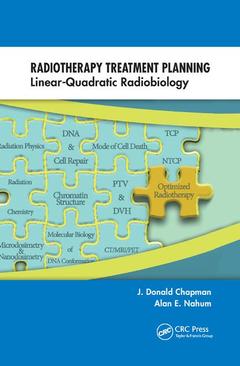Radiotherapy Treatment Planning Linear-Quadratic Radiobiology
Auteurs : Chapman J. Donald, Nahum Alan E.

Understand Quantitative Radiobiology from a Radiation Biophysics Perspective
In the field of radiobiology, the linear-quadratic (LQ) equation has become the standard for defining radiation-induced cell killing. Radiotherapy Treatment Planning: Linear-Quadratic Radiobiology describes tumor cell inactivation from a radiation physics perspective and offers appropriate LQ parameters for modeling tumor and normal tissue responses.
Explore the Latest Cell Killing Numbers for Defining Iso-Effective Cancer Treatments
The book compiles radiation mechanism information from biophysical publications of the past 50 years, addressing how ionizing radiation produces the killing of stem cells in human tumors. It presents several physical and chemical parameters that can modulate the radiation response of clonogenic cells in tumors. The authors describe the use of the LQ model in basic radiation mechanism studies with cells of relatively homogeneous radiation response and then extend the model to the fitting of survival data generated with heterogeneous cell populations (tumors). They briefly discuss how to use the LQ model for predicting tumor (local) control probability (TCP) and normal tissue complication probability (NTCP). The book also examines potential molecular targets related to alpha- and beta-inactivation and gives suggestions for further molecular characterizations of these two independent processes.
Develop Efficacious, Patient-Friendly Treatments at Reduced Costs
Focusing on quantitative radiobiology in LQ formulation, this book assists medical physicists and radiation oncologists in identifying improved cancer treatments. It also encourages investigators to translate potentially improved radiotherapy schedules based on TCP and NTCP modeling into actual patient benefit.
Introduction. The Generation of Quantitative Radiobiology Data. Intrinsic Radiosensitivity of Proliferating and Quiescent Cells. Effects of Ionization Density and Volume. Impact of Fraction Size, Dose-Rate, Temperature and Overall Treatment Time on Tumor Cell Response. Ionizing Events, Molecular Targets and Lethal Lesions. The Radiosensitivity of Tumor Cells In Vitro versus In Vivo. Modern Radiobiology and the LQ Equation. Normal Tissues Radiobiology. Radiobiology Applied to Tumor Response Modeling. Epilogue. References. Index.
J. Donald Chapman provides consulting services to various radiation medicine commercial and academic organizations. His research has contributed to the fields of hypoxic radiosensitizing drugs, nuclear medicine markers of viable hypoxic cells, mechanisms of photodynamic therapy, and the killing of tumor cells by ionizing radiations. He has authored and co-authored over 200 articles in scientific journals and conference proceedings, served on the editorial boards of numerous radiation research journals, and received several international research awards. He earned a PhD in biophysics from the Pennsylvania State University.
Alan E. Nahum is head of physics research at Clatterbridge Cancer Centre and a visiting professor in the Department of Physics at Liverpool University. His current research focuses on radiobiologically guided treatment optimization through the individualization of tumor prescription and fractionation. He has edited and co-edited three books, including Handbook of Radiotherapy Physics: Theory and Practice, and authored and co-authored approximately 170 peer-reviewed papers, book chapters, and conference proceedings. He earned a PhD in theoretical radiation dosimetry from the University of Edinburgh.
Date de parution : 12-2019
15.6x23.4 cm
Date de parution : 04-2015
15.6x23.4 cm
Thèmes de Radiotherapy Treatment Planning :
Mots-clés :
Intrinsic Radiosensitivity; Cellular DNA; intrinsic; Sublethal Damage Repair; radiosensitivities; LQ Model; tumor; NTCP; cell; Chinese Hamster Cells; linear-quadratic; Tcp Model; equation; G1 Phase Cell; killing; LQ Equation; clonogens; Normal Tissue Complication; model; Tumor Clonogens; radiation; Fox Chase Cancer Center; Dose Volume Histogram; DNA Lesion; Survival Curves; LDH; Ta Te; Ra Te; Late G2 Phase; Tcp; Multicellular Spheroids; Tumor Cell Radiosensitivity; Clonogenic Tumor Cells; DNA Strand Break; Cell Cycle Variation



